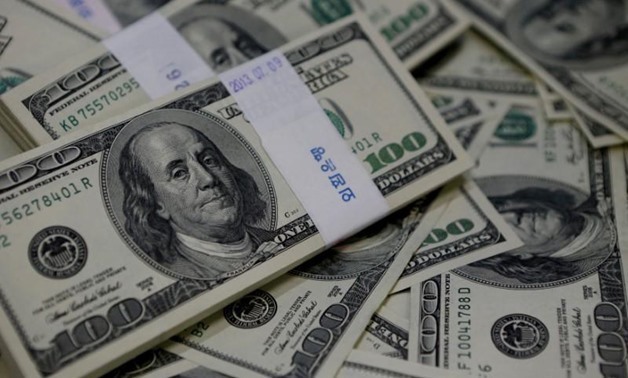
U.S. one-hundred dollar bills are seen in this picture illustration, August 2, 2013 – REUTERS/Kim Hong-Ji/Illustration
CAIRO – 3 March 2018: The exchange rate of the U.S dollar could reach between LE 17.25-17.5 for buying, down from its current level of LE 17.59, in the coming months, banking sources said Saturday.
For the past week the Egyptian pound has slightly strengthened against the US dollar, reaching an average of LE 17.59 at major banks.
The strengthening of the pound against the U.S dollar comes on the back of a number of factors, including the rise in Egypt’s foreign reserves, reaching more than $41 billion after the recent Eurobonds issuance, the sources said.
They added that other factors include an improvement in the revenues of tourism and investment as well as a gradual improvement in Egypt’s exports.
They said that a rise in the supply of dollars has pushed its exchange rate down against the Egyptian pound with an average of 5 piasters.
The sources further said that the reform program has eliminated the black market.
They added that the return of flights between Russia and Egypt, the start of production from the giant Zohr gas field, foreign direct investments and a rise in Egyptian exports would all contribute to the strengthening of the pound against the dollar.
Egypt returned to the international bond markets on February 14 with issuing Eurobonds worth $4 billion on three tranches; three, five and 30 years.
The purchase requests exceeded $12 billion in the first few hours after the issuance despite the volatility of the international stock markets, the Finance Ministry said.
Deputy Minister of Finance for Financial Policies Ahmed Kojak said that the Egyptian issue in the international markets has attracted more than 550 international investors from all target markets: Europe, America, Asia and the Middle East.
Egypt issued $7 billion in Eurobonds' sales in January and May 2017 on the global bond market, both of which were oversubscribed, according to the Ministry of Finance.
Egypt embarked on a bold economic reform program in 2014 that includes cutting energy subsidies and introducing new taxes to curb the budget deficit.
The country floated its local currency in November 2016, after which it clinched a $12 billion loan from the International Monetary Fund (IMF).

Comments
Leave a Comment